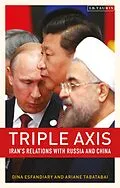The most significant challenge to the post-Cold War international order is the growing power of ambitious states opposed to the West. Iran, Russia and China each view the global structure through the prism of historical experience. Rejecting the universality of Western liberal values, these states and their governments each consider the relative decline of Western economic hegemony as an opportunity. Yet cooperation between them remains fragmentary. The end of Western sanctions and the Iranian nuclear deal; the Syrian conflict; new institutions in Central and East Asia: in all these areas and beyond, the potential for unity or divergence is striking. In this new and comprehensive study, Ariane Tabatabai and Dina Esfandiary address the substance of this `triple axis' in the realms of energy, trade, and military security. In particular they scrutinise Iran-Russia and the often overlooked field of Iran-China relations. Their argument - that interactions between the three will shape the world stage for decades to come - will be of interest to anyone looking to understand the contemporary international security puzzle.
Autorentext
Ariane Tabatabai is the Director of Curriculum and an Assistant Teaching Professor of Security Studies in the Georgetown University School of Foreign Service; a Senior Associate in the Proliferation Prevention Program at the Center for Strategic and International Studies (CSIS); a columnist for The Bulletin of the Atomic Scientists; and a Post-Doctoral Fellow at the Harvard Kennedy School's Belfer Center.
Inhalt
Introduction
Revisionist powers in a post-American world
Economic ties
Foreign policy
Defense
Prospects for future cooperation in a post-nuclear deal world
Conclusion
